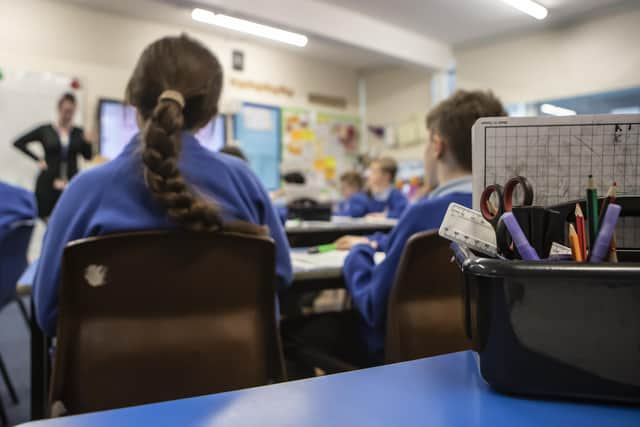Rate of persistently absent students in Nottinghamshire doubled since the pandemic
and live on Freeview channel 276
School leaders’ union NAHT said significant bolstering of funds to support students is needed if the Government is "serious about getting more pupils back into the classroom".
As part of our ongoing series looking at the Covid-19 pandemic's impact on society over the past four years, analysis figures from the Department for Education shows 21,115 students in state-funded schools across Nottinghamshire missed a tenth or more of sessions.
Advertisement
Hide AdAdvertisement
Hide AdThe school day is split into a morning and afternoon session, with every child expected to attend all sessions.


These students accounted for 19.2 per cent of the 110,013 students enrolled in the area during the 2022-23 academic year.
It was up significantly from 9.4 per cent in 2018-19, before the pandemic.
Across England, 1.6 million pupils were persistently absent – making up 21.2 per cent of students.
Advertisement
Hide AdAdvertisement
Hide AdIt is a slight improvement from 22.5 per cent in 2021-22, but nearly double the level in 2018-19 when just 10.9 per cent of pupils were persistently absent.
Paul Whiteman, general secretary of NAHT, said: "School leaders and teachers are doing all they can to reverse the increase in pupils who are persistently absent post-pandemic, and we are pleased to see the number of children coming back into school is moving in the right direction.
"However, absence rates are still significantly higher than before Covid and much more needs to be done to bring them down."
He added: "If the Government is serious about getting more pupils back into the classroom, there must be a significant bolstering of funding for the services that support schools including children’s social care, and mental health."
Advertisement
Hide AdAdvertisement
Hide AdIn Nottinghamshire, 2,722,000 of 38,305,000 school sessions were missed.
Of these absences, 905,000 (2.4 per cent) were unauthorised. It was up from 1.5 per cent in 2018-19.
Nationally, the level of unauthorised absences nearly doubled, from 1.4 per cent of sessions in 2018-19 to 2.4 per cent in the last academic year.
The DfE recently announced a series of measures as part of its drive to boost attendance after the pandemic – including increasing fines for parents taking children out of school without permission.
Advertisement
Hide AdAdvertisement
Hide AdSchool absence fines for unauthorised absences currently start at £60, rising to £120 if they are not paid within 21 days. From this autumn, they will instead start at £80, rising to £160.
Geoff Barton, general secretary of the Association of School and College Leaders, said: "Advertising slogans and attendance hubs are just not going to make a tangible difference to pupils who are missing days or weeks of school at a time. We have to be far more ambitious."
"If absence rates remain at these levels then the future prospects of thousands of young people are going to be jeopardised. They quite simply deserve better."
A DfE spokesperson said: "Thanks to our fantastic teachers and school leaders, and our package of wide-ranging reforms designed to support schools to improve attendance, we are already seeing rapid improvement, with now 440,000 fewer children persistently absent or not attending last year alone.
Advertisement
Hide AdAdvertisement
Hide Ad"We know that some children face greater barriers to attendance, like pupils with long term medical conditions or special educational needs and disabilities, which is why our guidance ensures schools work with pupils and families to respond to each pupils' individual needs."